厦门大学MBA面试真题
- 格式:doc
- 大小:33.00 KB
- 文档页数:5
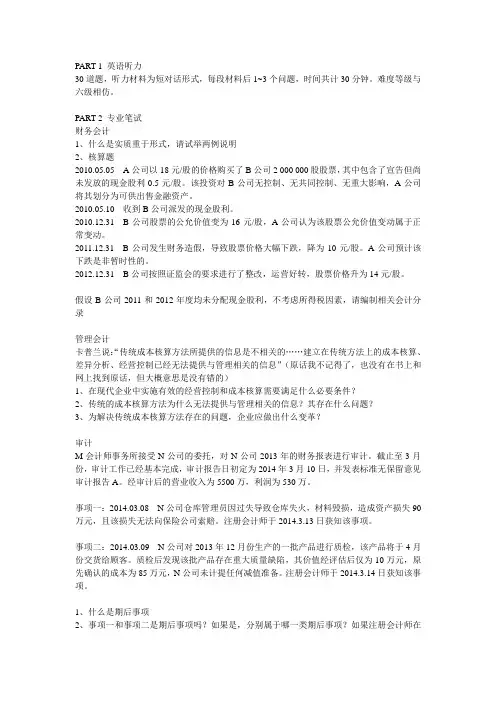
PART 1 英语听力30道题,听力材料为短对话形式,每段材料后1~3个问题,时间共计30分钟。
难度等级与六级相仿。
PART 2 专业笔试财务会计1、什么是实质重于形式,请试举两例说明2、核算题2010.05.05 A公司以18元/股的价格购买了B公司2 000 000股股票,其中包含了宣告但尚未发放的现金股利0.5元/股。
该投资对B公司无控制、无共同控制、无重大影响,A公司将其划分为可供出售金融资产。
2010.05.10 收到B公司派发的现金股利。
2010.12.31 B公司股票的公允价值变为16元/股,A公司认为该股票公允价值变动属于正常变动。
2011.12.31 B公司发生财务造假,导致股票价格大幅下跌,降为10元/股。
A公司预计该下跌是非暂时性的。
2012.12.31 B公司按照证监会的要求进行了整改,运营好转,股票价格升为14元/股。
假设B公司2011和2012年度均未分配现金股利,不考虑所得税因素,请编制相关会计分录管理会计卡普兰说:“传统成本核算方法所提供的信息是不相关的……建立在传统方法上的成本核算、差异分析、经营控制已经无法提供与管理相关的信息”(原话我不记得了,也没有在书上和网上找到原话,但大概意思是没有错的)1、在现代企业中实施有效的经营控制和成本核算需要满足什么必要条件?2、传统的成本核算方法为什么无法提供与管理相关的信息?其存在什么问题?3、为解决传统成本核算方法存在的问题,企业应做出什么变革?审计M会计师事务所接受N公司的委托,对N公司2013年的财务报表进行审计。
截止至3月份,审计工作已经基本完成,审计报告日初定为2014年3月10日,并发表标准无保留意见审计报告A。
经审计后的营业收入为5500万,利润为530万。
事项一:2014.03.08 N公司仓库管理员因过失导致仓库失火,材料毁损,造成资产损失90万元,且该损失无法向保险公司索赔。
注册会计师于2014.3.13日获知该事项。
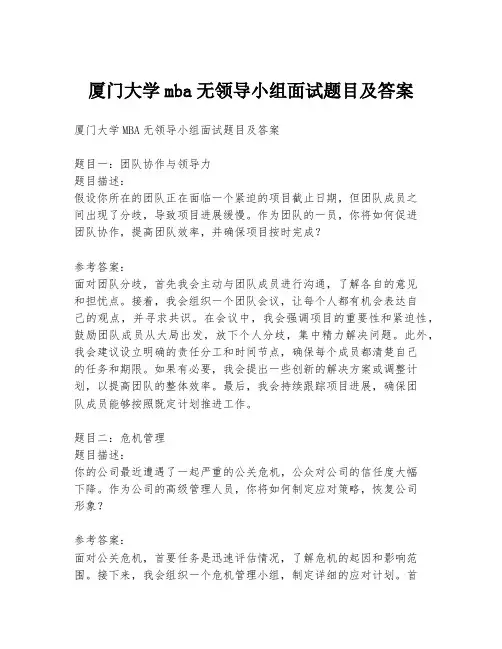
厦门大学mba无领导小组面试题目及答案厦门大学MBA无领导小组面试题目及答案题目一:团队协作与领导力题目描述:假设你所在的团队正在面临一个紧迫的项目截止日期,但团队成员之间出现了分歧,导致项目进展缓慢。
作为团队的一员,你将如何促进团队协作,提高团队效率,并确保项目按时完成?参考答案:面对团队分歧,首先我会主动与团队成员进行沟通,了解各自的意见和担忧点。
接着,我会组织一个团队会议,让每个人都有机会表达自己的观点,并寻求共识。
在会议中,我会强调项目的重要性和紧迫性,鼓励团队成员从大局出发,放下个人分歧,集中精力解决问题。
此外,我会建议设立明确的责任分工和时间节点,确保每个成员都清楚自己的任务和期限。
如果有必要,我会提出一些创新的解决方案或调整计划,以提高团队的整体效率。
最后,我会持续跟踪项目进展,确保团队成员能够按照既定计划推进工作。
题目二:危机管理题目描述:你的公司最近遭遇了一起严重的公关危机,公众对公司的信任度大幅下降。
作为公司的高级管理人员,你将如何制定应对策略,恢复公司形象?参考答案:面对公关危机,首要任务是迅速评估情况,了解危机的起因和影响范围。
接下来,我会组织一个危机管理小组,制定详细的应对计划。
首先,我们需要通过官方渠道发布声明,对事件进行公开透明的解释,并向公众表达诚挚的歉意。
同时,我们会积极与媒体沟通,确保信息传播的准确性和一致性。
其次,我们会采取实际行动来解决问题,比如加强内部管理,改进产品或服务,以实际成果来重建公众信任。
此外,我们还会加强与利益相关者的沟通,包括客户、合作伙伴和员工,确保他们了解我们的应对措施和改进计划。
最后,我们会定期发布进展报告,展示我们的努力和成果,逐步恢复公司形象。
题目三:创新思维题目描述:在当前竞争激烈的市场环境中,创新是企业生存和发展的关键。
请谈谈你如何通过创新思维来推动企业的持续发展。
参考答案:创新思维是推动企业发展的核心动力。
首先,我会鼓励团队成员保持好奇心和开放心态,不断探索新的市场机会和技术趋势。
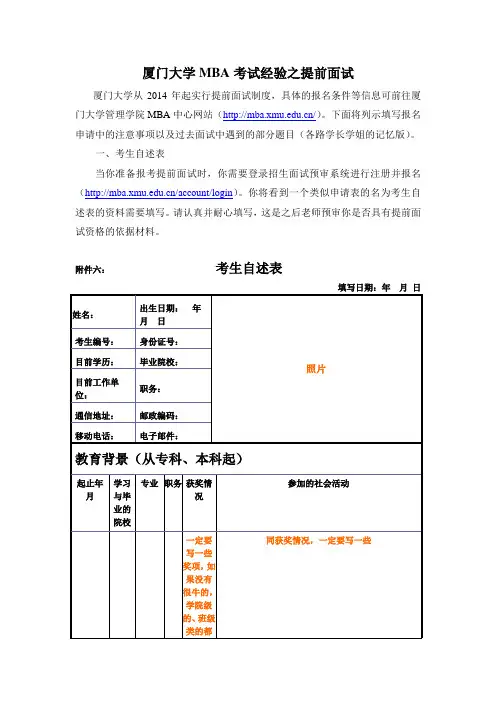
厦门大学MBA考试经验之提前面试厦门大学从2014年起实行提前面试制度,具体的报名条件等信息可前往厦门大学管理学院MBA中心网站(/)。
下面将列示填写报名申请中的注意事项以及过去面试中遇到的部分题目(各路学长学姐的记忆版)。
一、考生自述表当你准备报考提前面试时,你需要登录招生面试预审系统进行注册并报名(/account/login)。
你将看到一个类似申请表的名为考生自述表的资料需要填写。
请认真并耐心填写,这是之后老师预审你是否具有提前面试资格的依据材料。
附件六:考生自述表注意:填写的信息一定要真实,特别是工作经历、困难和解决等模块,因为这张自述表在未来个面时需要提交给面试老师,他可能会就这里面的信息提问。
二、面试(一)个面1、英文面试:(1)个人简介:简短,大约3分钟,太长记不住或是容易出错;(2)英文提问:比较灵活,老师根据你的自述表随意提问,不用太害怕,实在不会就say sorry,万一老师还要一直问,这就是给你施压,千万不要慌,尽最大努力答就好。
2、政治面试:关注当年热点,面试前总结一下,基本上是对热点问题的一些看法。
3、经历面试:可能是你的学习经历、可能是工作经历,如果你有些特别的经历,可能会使老师感兴趣的点。
(二)无领导小组讨论一个有关管理的材料,8-12名同学进行30分钟讨论,最终达成观点并由一名同学做总结。
1、面试中遇到的部分题目:2、三公费用降低60%,怎么看?3、抗日战争胜利七十周年,你有什么看法?4、问到我的职位“内部销售客户经理”,让我解释一下这个岗位的职责5、谈谈你对房地产行业的看法和你是怎么做的?6、为什么选择学习MBA7、对“三农”的看法8、人民币兑换美元汇率波动受什么因素影响?9、如何进行项目评估?10、薪酬与岗位方面的11对于互联网+的看法12、对于奥巴马访华,双方在经贸方面的对话怎么看?13、对于资本投资市场暗箱操作现象,如何健康发展的个人看法。
14、介绍下汽车行业在采购成本管控中对质量的管控方式15、如何做好管理梯队建设,16、阐述下目前企业服务的客户及客户情况17、如果要对金龙客车做一个品牌推广要如何建议,18、为什么三个职业跨度大,没有延续以前的职业1、一家互联网公司在上海设立分公司,上海分公司招聘一人力资源总监,该总监职业背景良好,但非常强势,上海分公司负责人不同意录用,互联网公司的老板很为难。
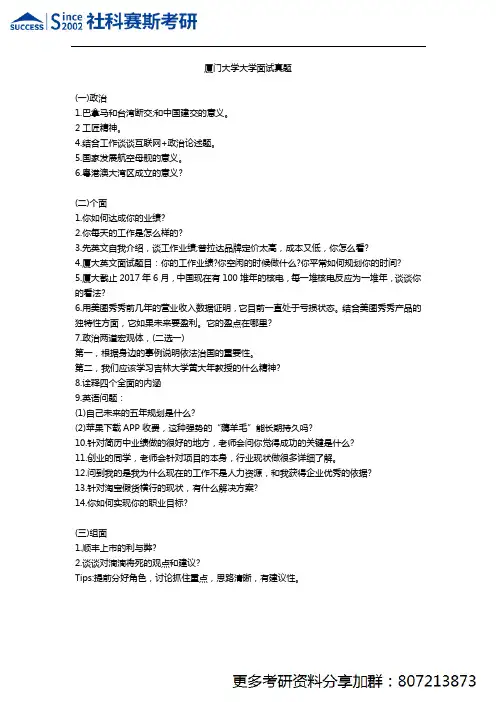
厦门大学大学面试真题
(一)政治
1.巴拿马和台湾断交;和中国建交的意义。
2工匠精神。
4.结合工作谈谈互联网+政治论述题。
5.国家发展航空母舰的意义。
6.粤港澳大湾区成立的意义?
(二)个面
1.你如何达成你的业绩?
2.你每天的工作是怎么样的?
3.先英文自我介绍,谈工作业绩;普拉达品牌定价太高,成本又低,你怎么看?
4.厦大英文面试题目:你的工作业绩?你空闲的时候做什么?你平常如何规划你的时间?
5.厦大截止2017年6月,中国现在有100堆年的核电,每一堆核电反应为一堆年,谈谈你的看法?
6.用美图秀秀前几年的营业收入数据证明,它目前一直处于亏损状态。
结合美图秀秀产品的独特性方面,它如果未来要盈利。
它的盈点在哪里?
7.政治两道宏观体,(二选一)
第一,根据身边的事例说明依法治国的重要性。
第二,我们应该学习吉林大学黄大年教授的什么精神?
8.诠释四个全面的内涵
9.英语问题:
(1)自己未来的五年规划是什么?
(2)苹果下载APP收费,这种强势的“薅羊毛”能长期持久吗?
10.针对简历中业绩做的很好的地方,老师会问你觉得成功的关键是什么?
11.创业的同学,老师会针对项目的本身,行业现状做很多详细了解。
12.问到我的是我为什么现在的工作不是人力资源,和我获得企业优秀的依据?
13.针对淘宝假货横行的现状,有什么解决方案?
14.你如何实现你的职业目标?
(三)组面
1.顺丰上市的利与弊?
2.谈谈对滴滴将死的观点和建议?
Tips:提前分好角色,讨论抓住重点,思路清晰,有建议性。
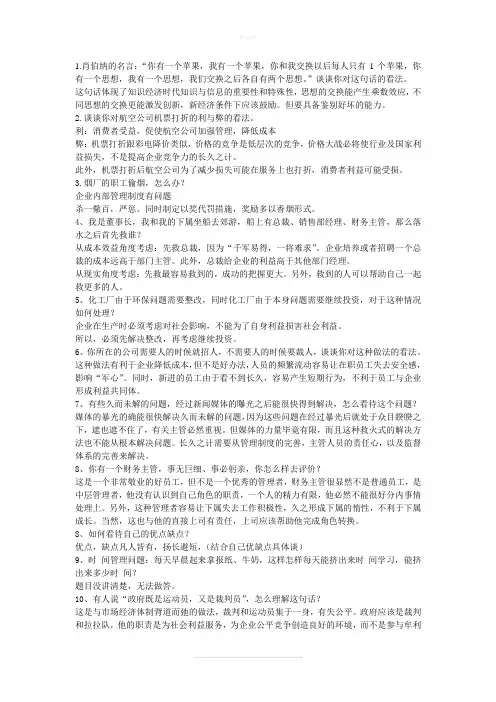
1.肖伯纳的名言:“你有一个苹果,我有一个苹果,你和我交换以后每人只有1个苹果,你有一个思想,我有一个思想,我们交换之后各自有两个思想。
”谈谈你对这句话的看法。
这句话体现了知识经济时代知识与信息的重要性和特殊性,思想的交换能产生乘数效应,不同思想的交换更能激发创新,新经济条件下应该鼓励。
但要具备鉴别好坏的能力。
2.谈谈你对航空公司机票打折的利与弊的看法。
利:消费者受益,促使航空公司加强管理,降低成本弊:机票打折跟彩电降价类似,价格的竞争是低层次的竞争,价格大战必将使行业及国家利益损失,不是提高企业竞争力的长久之计。
此外,机票打折后航空公司为了减少损失可能在服务上也打折,消费者利益可能受损。
3.烟厂的职工偷烟,怎么办?企业内部管理制度有问题杀一儆百,严惩。
同时制定以奖代罚措施,奖励多以香烟形式。
4、我是董事长,我和我的下属坐船去郊游,船上有总裁、销售部经理、财务主管,那么落水之后首先救谁?从成本效益角度考虑:先救总裁,因为“千军易得,一将难求”。
企业培养或者招聘一个总裁的成本远高于部门主管。
此外,总裁给企业的利益高于其他部门经理。
从现实角度考虑:先救最容易救到的,成功的把握更大。
另外,救到的人可以帮助自己一起救更多的人。
5、化工厂由于环保问题需要整改,同时化工厂由于本身问题需要继续投资,对于这种情况如何处理?企业在生产时必须考虑对社会影响,不能为了自身利益损害社会利益。
所以,必须先解决整改,再考虑继续投资。
6、你所在的公司需要人的时候就招人,不需要人的时候要裁人,谈谈你对这种做法的看法。
这种做法有利于企业降低成本,但不是好办法,人员的频繁流动容易让在职员工失去安全感,影响“军心”。
同时,新进的员工由于看不到长久,容易产生短期行为,不利于员工与企业形成利益共同体。
7、有些久而未解的问题,经过新闻媒体的曝光之后能很快得到解决,怎么看待这个问题?媒体的暴光的确能很快解决久而未解的问题,因为这些问题在经过暴光后就处于众目睽睽之下,遮也遮不住了,有关主管必然重视。

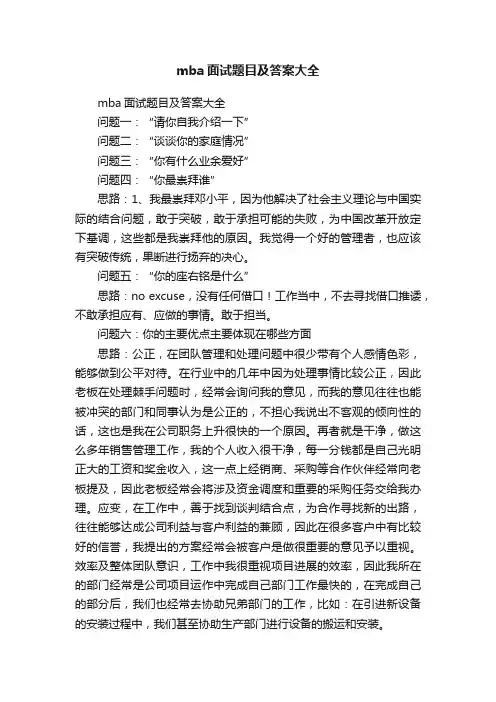
mba面试题目及答案大全mba面试题目及答案大全问题一:“请你自我介绍一下”问题二:“谈谈你的家庭情况”问题三:“你有什么业余爱好”问题四:“你最崇拜谁”思路:1、我最崇拜邓小平,因为他解决了社会主义理论与中国实际的结合问题,敢于突破,敢于承担可能的失败,为中国改革开放定下基调,这些都是我崇拜他的原因。
我觉得一个好的管理者,也应该有突破传统,果断进行扬弃的决心。
问题五:“你的座右铭是什么”思路:no excuse,没有任何借口!工作当中,不去寻找借口推诿,不敢承担应有、应做的事情。
敢于担当。
问题六:你的主要优点主要体现在哪些方面思路:公正,在团队管理和处理问题中很少带有个人感情色彩,能够做到公平对待。
在行业中的几年中因为处理事情比较公正,因此老板在处理棘手问题时,经常会询问我的意见,而我的意见往往也能被冲突的部门和同事认为是公正的,不担心我说出不客观的倾向性的话,这也是我在公司职务上升很快的一个原因。
再者就是干净,做这么多年销售管理工作,我的个人收入很干净,每一分钱都是自己光明正大的工资和奖金收入,这一点上经销商、采购等合作伙伴经常向老板提及,因此老板经常会将涉及资金调度和重要的采购任务交给我办理。
应变,在工作中,善于找到谈判结合点,为合作寻找新的出路,往往能够达成公司利益与客户利益的兼顾,因此在很多客户中有比较好的信誉,我提出的方案经常会被客户是做很重要的意见予以重视。
效率及整体团队意识,工作中我很重视项目进展的效率,因此我所在的部门经常是公司项目运作中完成自己部门工作最快的,在完成自己的部分后,我们也经常去协助兄弟部门的工作,比如:在引进新设备的安装过程中,我们甚至协助生产部门进行设备的搬运和安装。
问题七:“谈谈你的缺点”思路:对效率的苛求,跟我合作的同事和客户经常会被我的进度追踪搞得比较头疼,当一项工作确定要干后,我经常会做一个完成工作的各部门进度约定,每日提醒大家的进度,连沃尔玛的采购都有点吃不消我们的进度要求。
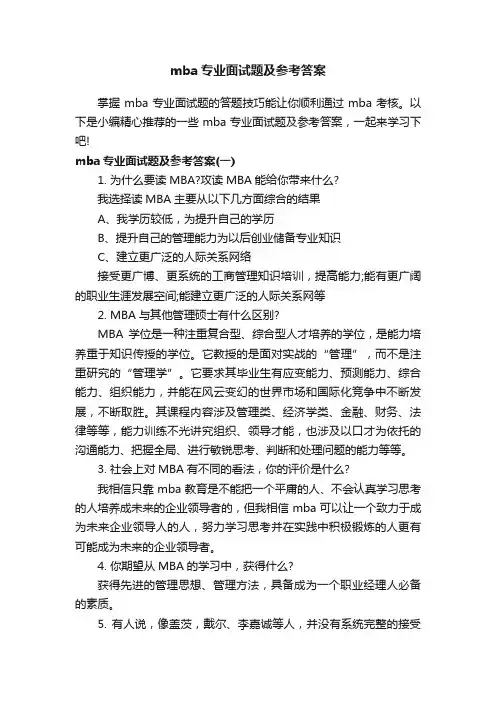
mba专业面试题及参考答案掌握mba专业面试题的答题技巧能让你顺利通过mba考核。
以下是小编精心推荐的一些mba专业面试题及参考答案,一起来学习下吧!mba专业面试题及参考答案(一)1. 为什么要读MBA?攻读MBA能给你带来什么?我选择读MBA主要从以下几方面综合的结果A、我学历较低,为提升自己的学历B、提升自己的管理能力为以后创业储备专业知识C、建立更广泛的人际关系网络接受更广博、更系统的工商管理知识培训,提高能力;能有更广阔的职业生涯发展空间;能建立更广泛的人际关系网等2. MBA与其他管理硕士有什么区别?MBA学位是一种注重复合型、综合型人才培养的学位,是能力培养重于知识传授的学位。
它教授的是面对实战的“管理”,而不是注重研究的“管理学”。
它要求其毕业生有应变能力、预测能力、综合能力、组织能力,并能在风云变幻的世界市场和国际化竞争中不断发展,不断取胜。
其课程内容涉及管理类、经济学类、金融、财务、法律等等,能力训练不光讲究组织、领导才能,也涉及以口才为依托的沟通能力、把握全局、进行敏锐思考、判断和处理问题的能力等等。
3. 社会上对MBA有不同的看法,你的评价是什么?我相信只靠mba教育是不能把一个平庸的人、不会认真学习思考的人培养成未来的企业领导者的,但我相信mba可以让一个致力于成为未来企业领导人的人,努力学习思考并在实践中积极锻炼的人更有可能成为未来的企业领导者。
4. 你期望从MBA的学习中,获得什么?获得先进的管理思想、管理方法,具备成为一个职业经理人必备的素质。
5. 有人说,像盖茨,戴尔、李嘉诚等人,并没有系统完整的接受管理教育,同样成为知名企业家,这样看来,学习MBA还有用吗?大家之所以提盖茨、戴尔、李嘉诚等人是为激励那些学历不是很好的人,纵观世界上成功的企业家绝大多数都拥有高学历。
反面案例是用来激励人的,而不是引导我们选择不继续学习。
6. 你作为长期从事技术工作的人员,适合读MBA吗?是否适合读MBA关键看这个人是否具有管理才能,是否需要拓展视野,很多企业的管理者都是技术出生,如果又能系统的学习管理知识,那对其从事管理工作非常有利的。
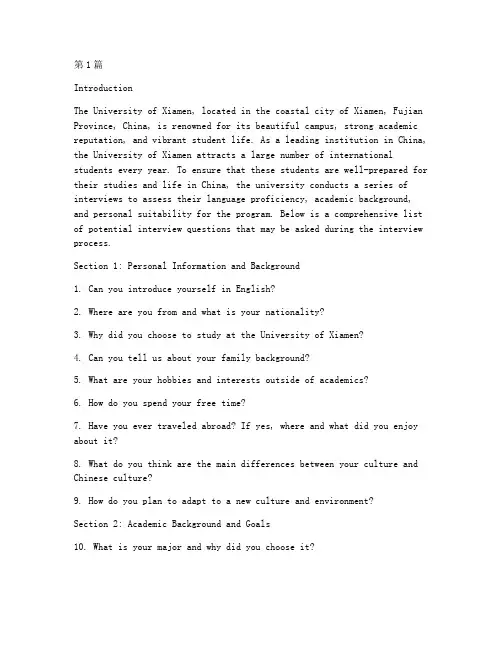
第1篇IntroductionThe University of Xiamen, located in the coastal city of Xiamen, Fujian Province, China, is renowned for its beautiful campus, strong academic reputation, and vibrant student life. As a leading institution in China, the University of Xiamen attracts a large number of international students every year. To ensure that these students are well-prepared for their studies and life in China, the university conducts a series of interviews to assess their language proficiency, academic background, and personal suitability for the program. Below is a comprehensive list of potential interview questions that may be asked during the interview process.Section 1: Personal Information and Background1. Can you introduce yourself in English?2. Where are you from and what is your nationality?3. Why did you choose to study at the University of Xiamen?4. Can you tell us about your family background?5. What are your hobbies and interests outside of academics?6. How do you spend your free time?7. Have you ever traveled abroad? If yes, where and what did you enjoy about it?8. What do you think are the main differences between your culture and Chinese culture?9. How do you plan to adapt to a new culture and environment?Section 2: Academic Background and Goals10. What is your major and why did you choose it?11. Can you describe your academic achievements in high school or previous education?12. What are your strengths and weaknesses as a student?13. How do you handle stress and pressure in your studies?14. Have you participated in any extracurricular activities or community service during your studies? If yes, what were they?15. What are your academic goals for the next few years?16. How do you plan to utilize your degree after graduation?17. Are there any specific courses or professors at the University of Xiamen that you are interested in?18. What are your expectations for the academic environment at the University of Xiamen?Section 3: Language Proficiency19. How long have you been studying English?20. What is your proficiency level in English, according to the Common European Framework of Reference for Languages (CEFR)?21. Can you describe a challenging situation where you had to use English and how you dealt with it?22. How do you improve your English language skills?23. Do you have any experience in English-speaking environments or cultures?24. How would you rate your listening, speaking, reading, and writing skills in English?25. What are your strategies for overcoming language barriers?Section 4: Motivation and Reasons for Applying26. Why do you want to study in China?27. What do you think are the advantages and disadvantages of studyingin a different country?28. How do you plan to contribute to the diversity of the University of Xiamen?29. Can you describe a time when you had to work in a team with people from different backgrounds?30. What are your expectations for the university's cultural exchange programs?31. How do you plan to engage with Chinese students and the local community?32. What are your long-term career aspirations and how does studying at the University of Xiamen align with them?33. Why do you think you are a good fit for the University of Xiamen?Section 5: Challenges and Adaptation34. What challenges do you anticipate facing while studying in China and how do you plan to overcome them?35. How do you deal with homesickness or feelings of isolation?36. What are your expectations regarding the university's support for international students?37. How do you plan to balance your academic responsibilities with personal life and social activities?38. Can you describe a situation where you had to adjust to a new environment and what you learned from it?39. How do you maintain a healthy lifestyle while studying abroad?40. What are your thoughts on the importance of cross-cultural communication and collaboration?Section 6: Additional Questions41. Do you have any questions for us?42. Can you provide any additional information about your application or personal experiences?43. What do you think is the most important skill for a successful student?44. How do you prioritize your tasks and manage your time effectively?45. Can you describe a leadership experience you have had and what you learned from it?46. What are your thoughts on the role of technology in education?47. How do you plan to stay connected with your family and friends back home?48. What are your expectations for the Chinese education system?49. How do you think studying at the University of Xiamen will benefit your future career?50. What advice would you give to a prospective international student considering studying in China?This comprehensive list of interview questions is designed to provide a framework for the University of Xiamen's interview process. While the actual questions may vary, these questions will help candidates prepare for the interview and demonstrate their suitability for the program. Good luck with your application!第2篇IntroductionXiamen University, located in the beautiful coastal city of Xiamen, China, is renowned for its academic excellence and vibrant campus life. As part of the admission process for international students, a comprehensive English interview is conducted to assess the candidate's language proficiency and suitability for the program. Below is acomprehensive list of potential interview questions that may be asked during the English interview at Xiamen University.Section 1: Introduction and Background1. Can you tell us a little about yourself?2. Why did you choose to apply to Xiamen University?3. What are your academic interests?4. Can you describe your educational background?5. What are some of the most significant challenges you have faced in your academic journey?6. How do you think your previous experiences have prepared you for studying at Xiamen University?7. What are your long-term career goals?8. How do you plan to contribute to the academic community at Xiamen University?9. Can you share any extracurricular activities or hobbies you are involved in?10. What do you like to do in your free time?Section 2: Language Proficiency11. Why do you think English is important in today's globalized world?12. Can you describe a situation where you had to use English in a real-life context?13. How would you describe your level of English proficiency?14. What are your strengths and weaknesses in English?15. Can you tell us about a book or movie that you recently watched or read in English?16. How do you approach learning a new language?17. What are some challenges you have faced while learning English?18. How do you stay motivated to improve your English skills?19. Can you explain the difference between formal and informal English?20. What are some common English idioms or phrases that you use frequently?Section 3: Academic and Professional Skills21. What research projects or papers have you worked on?22. How do you approach problem-solving in your academic work?23. Can you describe a time when you had to work as part of a team?24. What are your strengths and weaknesses in team projects?25. How do you handle stress or pressure in academic or professional settings?26. What are some strategies you use to manage your time effectively?27. Can you explain a complex concept or theory in your field using simple English?28. How do you stay updated with the latest developments in your field?29. What are your thoughts on the importance of lifelong learning?30. How do you approach writing academic papers or reports?Section 4: Cultural Awareness and Adaptability31. How would you describe your cultural background?32. Can you share an experience where you had to adapt to a new culture?33. What are your thoughts on cultural diversity?34. How do you think cultural differences can impact communication?35. What are some challenges you might face as an international student in China?36. How do you plan to overcome these challenges?37. Can you tell us about a time when you had to work with someone froma different cultural background?38. How do you approach cultural misunderstandings or conflicts?39. What are your thoughts on cross-cultural collaboration?40. How do you think your cultural background will contribute to your studies at Xiamen University?Section 5: Specific Program-related Questions41. Can you tell us about your chosen major or program?42. What do you hope to learn from this program?43. How do you plan to apply what you learn in your future career?44. What are some of the most interesting courses you have taken or would like to take?45. How do you think your program of study will help you achieve your career goals?46. What are some of the key skills you hope to develop during your time at Xiamen University?47. How do you plan to engage with the faculty and staff at Xiamen University?48. What are your expectations of the academic environment at Xiamen University?49. How do you plan to integrate into the student community at Xiamen University?50. Can you tell us about any specific clubs or organizations you are interested in joining?ConclusionThe English interview at Xiamen University is designed to assess a candidate's overall language proficiency, academic abilities, cultural awareness, and adaptability. By thoroughly preparing for the questions outlined above, candidates can demonstrate their suitability for the program and their enthusiasm for studying at Xiamen University. Good luck!---Note: The above questions are meant to provide a comprehensive guide for candidates preparing for the English interview at Xiamen University. The actual interview may include additional questions or focus on different aspects of the candidate's background and skills.第3篇IntroductionXiamen University, located in the scenic coastal city of Xiamen, China, is renowned for its beautiful campus and strong academic programs. As a prestigious institution, Xiamen University attracts candidates from all over the world. To ensure that candidates possess a high level of English proficiency, the university has developed a comprehensive interview process. Below are a variety of English interview questions that candidates might encounter during their interview at Xiamen University.Section 1: Introduction and Background1. Can you tell us a little about yourself?2. Where are you from, and what do you enjoy most about your home country?3. What motivated you to apply to Xiamen University?4. Can you describe your educational background and any notable achievements?5. How did you prepare for this interview?6. What do you know about Xiamen University and its programs?7. Why do you think you would be a good fit for your chosen program?8. Can you tell us about a challenging experience you have overcome?9. How do you handle stress or pressure in your personal or academic life?10. What are your long-term career goals, and how does Xiamen University fit into your plan?Section 2: Language Proficiency11. What is your native language, and how long have you been learning English?12. Can you describe a situation where you had to use English in a professional or academic setting?13. How would you describe your level of English proficiency (e.g., reading, writing, speaking, listening)?14. What are your strengths and weaknesses in English?15. Can you give an example of a book, movie, or TV show you have recently watched or read, and how it affected you?16. How do you stay updated with current events or news in English?17. Can you summarize a recent article or news report in English?18. What is your favorite English language song or poem, and why?19. How do you feel about using English in an academic environment?20. Can you describe a time when you had to use English to communicate with someone who spoke a different language?Section 3: Critical Thinking and Problem-Solving21. Describe a complex problem you have faced and how you solved it.22. What are your views on the importance of critical thinking in your field of study?23. How do you approach research, and what sources do you use to gather information?24. Can you give an example of a time when you had to work under a tight deadline?25. What is your approach to decision-making, and how do you weigh different options?26. How do you handle conflicts or disagreements with peers or colleagues?27. Can you explain a concept or theory that is relevant to your field of study?28. What are some emerging trends in your field, and how do you think they will impact the future?29. How do you stay informed about new developments in your field?30. Can you discuss the ethical implications of your chosen field?Section 4: Communication and Interpersonal Skills31. Describe a situation where you had to communicate a difficult message to someone.32. How do you handle feedback or criticism, both positive and negative?33. What are your strengths in team projects or group work?34. Can you give an example of a time when you had to work with someone who had a different working style?35. How do you build rapport and maintain relationships with colleagues or clients?36. What is your approach to public speaking or presentations?37. How do you handle stress or nervousness during a presentation?38. Can you describe a successful collaboration you have been a part of?39. What are your communication preferences (e.g., in-person, email, phone)?40. How do you ensure effective communication in a diverse team?Section 5: Adaptability and Cultural Awareness41. Describe a time when you had to adapt to a new environment or culture.42. How do you handle cultural differences or misunderstandings in a professional setting?43. What are your views on globalization, and how does it affect your field of study?44. Can you give an example of a cultural practice or tradition that you find interesting or unique?45. How do you incorporate cultural diversity into your work or projects?46. What are your experiences with living or studying in a different country?47. How do you maintain a balance between your personal and professional life, especially when dealing with cultural differences?48. What are your views on multiculturalism and its benefits?49. Can you discuss a global issue that is relevant to your field of study?50. How do you think your cultural background has influenced your approach to learning and problem-solving?ConclusionThese interview questions are designed to assess a candidate's English proficiency, critical thinking, problem-solving skills, communication abilities, and cultural awareness. The questions aim to provide acomprehensive understanding of the candidate's suitability for Xiamen University and its programs. Candidates should prepare thoroughly for their interview, ensuring they can confidently answer these questions and demonstrate their qualifications for the chosen program. Good luck!。
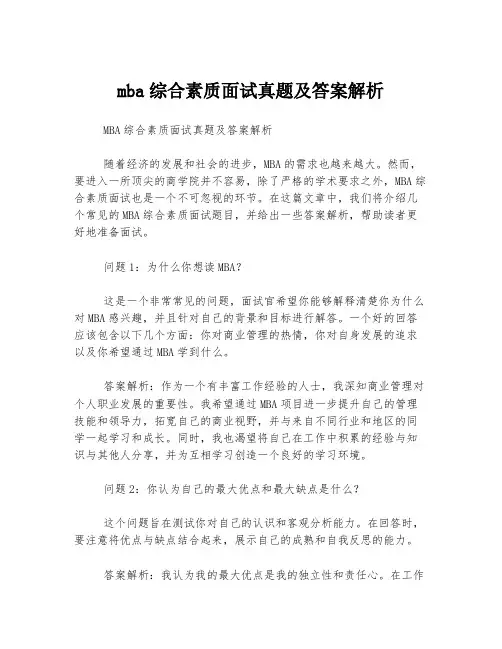
mba综合素质面试真题及答案解析MBA综合素质面试真题及答案解析随着经济的发展和社会的进步,MBA的需求也越来越大。
然而,要进入一所顶尖的商学院并不容易,除了严格的学术要求之外,MBA综合素质面试也是一个不可忽视的环节。
在这篇文章中,我们将介绍几个常见的MBA综合素质面试题目,并给出一些答案解析,帮助读者更好地准备面试。
问题1:为什么你想读MBA?这是一个非常常见的问题,面试官希望你能够解释清楚你为什么对MBA感兴趣,并且针对自己的背景和目标进行解答。
一个好的回答应该包含以下几个方面:你对商业管理的热情,你对自身发展的追求以及你希望通过MBA学到什么。
答案解析:作为一个有丰富工作经验的人士,我深知商业管理对个人职业发展的重要性。
我希望通过MBA项目进一步提升自己的管理技能和领导力,拓宽自己的商业视野,并与来自不同行业和地区的同学一起学习和成长。
同时,我也渴望将自己在工作中积累的经验与知识与其他人分享,并为互相学习创造一个良好的学习环境。
问题2:你认为自己的最大优点和最大缺点是什么?这个问题旨在测试你对自己的认识和客观分析能力。
在回答时,要注意将优点与缺点结合起来,展示自己的成熟和自我反思的能力。
答案解析:我认为我的最大优点是我的独立性和责任心。
在工作中,我善于发现问题并主动解决,能够独立完成任务并对自己负责。
然而,我的一个最大缺点是有时候我过于追求完美,对自己的要求过高,这可能会导致一些过分纠结和压力。
为了解决这个问题,我在工作中学会了更好地分配工作量和与团队成员合作,以减轻个人压力并提高整体效率。
问题3:你如何看待团队合作?团队合作是商业管理中非常重要的一环,面试官希望了解你对团队合作的认识和经验。
在回答时,可以结合自己的实际经历和观点来展示自己的团队合作能力。
答案解析:我非常重视团队合作,并且在许多项目中都有相关经验。
我认为团队合作可以集思广益,充分发挥每个人的优势,从而达到更好的工作效果。
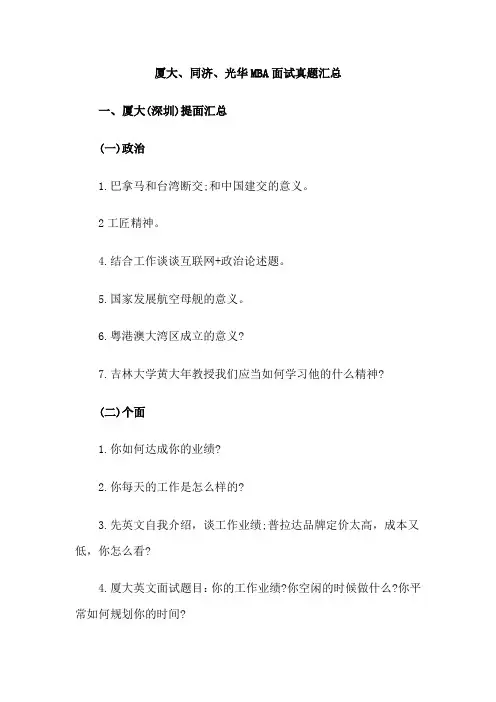
厦大、同济、光华MBA面试真题汇总一、厦大(深圳)提面汇总(一)政治1.巴拿马和台湾断交;和中国建交的意义。
2工匠精神。
4.结合工作谈谈互联网+政治论述题。
5.国家发展航空母舰的意义。
6.粤港澳大湾区成立的意义?7.吉林大学黄大年教授我们应当如何学习他的什么精神?(二)个面1.你如何达成你的业绩?2.你每天的工作是怎么样的?3.先英文自我介绍,谈工作业绩;普拉达品牌定价太高,成本又低,你怎么看?4.厦大英文面试题目:你的工作业绩?你空闲的时候做什么?你平常如何规划你的时间?5.厦大截止2017年6月,中国现在有100堆年的核电,每一堆核电反应为一堆年,谈谈你的看法?6.用美图秀秀前几年的营业收入数据证明,它目前一直处于亏损状态。
结合美图秀秀产品的独特性方面,它如果未来要盈利。
它的盈点在哪里?7.政治两道宏观体,(二选一)第一,根据身边的事例说明依法治国的重要性。
第二,我们应该学习吉林大学黄大年教授的什么精神?8.诠释四个全面的内涵9.英语问题:(1)自己未来的五年规划是什么?(2)苹果下载APP收费,这种强势的“薅羊毛”能长期持久吗?10.针对简历中业绩做的很好的地方,老师会问你觉得成功的关键是什么?11.创业的同学,老师会针对项目的本身,行业现状做很多详细了解。
12.问到我的是我为什么现在的工作不是人力资源,和我获得企业优秀的依据?13.针对淘宝假货横行的现状,有什么解决方案?14.你如何实现你的职业目标?(三)组面1.顺丰上市的利与弊?2.谈谈对滴滴将死的观点和建议?Tips:提前分好角色,讨论抓住重点,思路清晰,有建议性。
二、同济大学(深圳)提前面试题汇总(一)面试流程7:30准时所有面试候选人开始入场,被安排在会议室内等待,约五分钟,主持的老师开始讲解整个面试流程:签到——验证——政治笔试(20分钟)——组面——个面(综合、英语)。
整个流程开始启动,老师开始点名抽签,抽到的号码代表你即将被分到的小组与个面教室,同时老师给席卡和面试场次凭证(随身携带)接着拿着身份证、学历证书、学位证书走到老师面前,进行基本验证,程序比较简单,但同济MBA官网要求候选人带好所有上传资料原件,希望接下来的同学是带好,有备无患!将所有证件带回考场座位,整理妥当后,开始耐心等待小组队员出现,最后抽签结果:小组6人,候选人准备进入政治考试流程。
厦门大学MPA面试过程真题
(1)英文面试比较简单
主要是自我介绍;然后是简单问几个问题,比如你的爱好,你对毕业学校的印象,你为什么读MPA,你的职业规划,MPA 毕业之后打算换工作吗。
(2)中文面试是开放性的,主要是就你的背景包括现在的工作背景或以前的学习经历提问;
还有就是问时事热点问题,比如雾霾、依法治国、简政放权反腐、南海、钓鱼岛……
另外也会问一些专业的管理方面的问题,比如你认为你所在的单位管理上存在什么问题,你认为应当如何改进。
厦门大学MPA复试综合能力面试
一、英文面试
英文自我介绍,自我介绍完之后,老师还会根据你说的内容追加一个英文问题,这个问题可能简单的爱好、家庭、为什么读mpa等,也可能是你没准备过的,比如
1如政府与市场的关系
2权利power和权力right的
3你对包括大学的suggestion
4career development
5如何准备这个复式的how did you prepare;
二、抽题目中文回答。
题目有这些:
1快的专车和出租车
2 如何设计廉政指数
4谈透明国际
5医疗改革
6环境问题雾霾
7、谈谈政府的社会职能。
谈谈对政府招商的看法。
8、谈谈政府购买公共服务对行政体制改革有什么作用?
9、年轻人啃老的现象应该是用法律规范为主、道德约束为辅还是应该用道德约束为主、法律规范为辅?
10、青年志愿者去养老院给老年人洗脚活动往往只能坚持几个月,这种活动最终只留于形式,请谈谈对这一现象的看法?
11、谈谈你看过那些公共管理学的著作,记得哪些理论。
厦大MBA2018年提前面试真题汇总及解析欢迎报考厦大MBA,预祝本周参加面试的同学们过关斩将,超常发挥!1.分析香港在大湾区内的一国两制优势,区域优势。
深圳也在大湾区内的优势。
2.深港如何合作,如何给一带一路概念带来新的发展。
3.如何看待吉利收购沃尔沃?解析:吉利战略转型对技术和品牌的诉求,渴望技术、提升品牌帮助中国自主品牌汽车企业尽快走向国际市场通过海外并购,用较低的成本,获取国际汽车品牌核心技术和国际营销渠道吉利收购沃尔沃,是中国汽车产业实现技术跨越的一个捷径,可以迅速提高中国汽车产业的软实力4.环境生态污染(政治)5.东阿阿胶提价的策略是否会成功,为什么?(组面)解析:对于公司来说,阿胶价格上调意味着公司的盈利能力将得到提高,投资者会从中得利。
对于同行业来说,东阿阿胶的价格已经涨到如此之高,必然会流失一部分低端市场,那么,这就给一些小的品牌让出了市场。
对于产业链上下游而言,东阿阿胶产品的涨价,提高了整个产业链的收益。
6.共享单车的未来(组面)7.对中欧合作的看法(政治)8.乐视(组面)9.你认为中国的司法体制怎么样?(政治)10.一个利用网络做外卖,O2O+餐饮,定位高端用户,商业模式是建立中央大厨房配送,在北京市周边建立 24个众标配送店,一年后失败了,问失败的原因?(组面)11.瓶颈12.美图秀秀13.巴拿马和台湾断交,和中国建交的意义。
14.工匠精神。
15.结合工作谈谈互联网+政治论述题。
16.国家发展航空母舰的意义。
解析:航母是国家综合实力的体现,在很大程度上,可以从航母编队上体现出来。
有了航母以后,国家的海上力量将出现立体化、体系化、综合化和信息化的提升,将一个国家的海上活动能力从近海推向了中远海。
航母编队同时带来整个国家军事力量,最直接的就是海军力量编制体制、指挥体系以及后勤保障的变化,甚至于法规条令、作战理论等一系列变化,从而使国家海空力量出现结构性的调整和变化。
17.粤港澳大湾区成立的意义?解析:加强基础设施互联互通,形成与区域经济社会发展相适应的基础设施体系,重点共建“一中心三网”,形成辐射国内外的综合交通体系;打造全球创新高地,合作打造全球科技创新平台,构建开放型创新体系,完善创新合作体制机制,建设粤港澳大湾区创新共同体,逐步发展成为全球重要科技产业创新中心;携手构建“一带一路”开放新格局,深化与沿线国家基础设施互联互通及经贸合作,深入推进粤港澳服务贸易自由化,打造CEPA升级版;培育利益共享的产业价值链,加快向全球价值链高端迈进,打造具有国际竞争力的现代产业先导区。
工商管理硕士MB全面试训练题一、概述工商管理硕士(Master of Business Administration,简称MBA)是一种专业学位,旨在培养具备国际视野、创新思维和领导力的管理人材。
MBA考试是申请攻读工商管理硕士学位的重要环节之一,其中全面试是MBA考试的一部份。
本文将根据给定的任务名称,提供一套全面试训练题的标准格式文本,以供参考。
二、题目及答案1. 请简要介绍SWOT分析的概念,并结合一个实际案例进行说明。
SWOT分析是一种常用的战略管理工具,用于评估一个组织或者个人的优势、劣势、机会和威胁。
其中,优势和劣势是内部因素,机会和威胁是外部因素。
通过分析这些因素,可以匡助组织或者个人制定相应的战略,以应对内外环境的变化。
案例:某公司是一家新兴的科技企业,主要从事智能家居产品的研发和销售。
该公司进行SWOT分析后,得出以下结论:- 优势:技术实力雄厚、独特的产品设计、高效的供应链管理。
- 劣势:市场知名度不高、竞争压力较大、产品定价相对较高。
- 机会:智能家居市场增长迅速、政府政策支持科技创新、合作火伴资源丰富。
- 威胁:竞争对手产品同质化严重、市场准入门坎降低、原材料价格上涨。
基于以上分析,该公司可以制定战略,如加大市场宣传力度提高知名度,降低产品定价以增加市场份额,积极寻求合作火伴以拓展资源等。
2. 请解释并区分市场份额和市场增长率,并说明它们对企业的影响。
市场份额是指企业在特定市场中的销售额占整个市场销售额的比例。
市场增长率是指特定市场在一段时间内销售额的增长率。
市场份额反映了企业在市场中的竞争地位和市场占有率。
较高的市场份额意味着企业在市场中具有较大的影响力和竞争优势。
企业可以通过提高市场份额来实现更高的销售额和利润。
市场增长率则反映了市场的潜力和发展速度。
较高的市场增长率意味着市场需求的增加,为企业提供了更多的商机。
企业可以通过抓住市场增长率高的机会,扩大销售额和市场份额。
MBA联考综合能力模拟试题及答案解析(4)(1/22)逻辑推理下列每题给出的A、B、C、D、E五个选项中,只有一个选项符合试题要求。
第1题某公司招聘的新职员必须通过三个方面的测试:(1)业务能力;(2)综合技能;(3)心理素质。
在前去应聘的方超、钱雪、张梅、李平四人中,每个人都只有一项测试未通过。
其中,李平、钱雪和张梅都通过了第一项,方超和李平都通过了第二项,未通过第三项的只有李平和钱雪之中的一人。
如果上述陈述都是真的,则下面的断定正确的是:A.李平未通过第三项测试,方超未通过第一项测试。
B.李平和张梅都通过了第三项测试。
C.方超和钱雪都通过了第二项测试。
D.方超、钱雪、张梅和李平都通过了第一项测试。
E.方超和张梅都通过了第二项测试。
下一题(2~3/共22题)逻辑推理下列每题给出的A、B、C、D、E五个选项中,只有一个选项符合试题要求。
35~36题基于以下题干:年初,为激励员工努力工作,某公司决定根据每月的工作绩效评选“月度之星”。
王某在当年前10个月恰好只在连续的4个月中当选“月度之星”,他的另外三个同事郑某、吴某、周某也做到了这一点。
关于这四人当选“月度之星”的月份,已知:(1)王某和郑某仅有三个月同时当选;(2)郑某和吴某仅有三个月同时当选;(3)王某和周某不曾在同一个月当选;(4)仅有2人在7月同时当选;(5)至少有1人在1月当选。
第2题根据以上信息,有3人同时当选“月度之星”的月份是A.1~3月B.2~4月C.3~5月D.4~6月E.5~7月第3题根据以上信息,王某当选“月度之星”的月份是A.1~4月B.3~6月C.4~7月D.5~8月E.7~10月上一题下一题(4/22)逻辑推理下列每题给出的A、B、C、D、E五个选项中,只有一个选项符合试题要求。
第4题自然界的水因与大气、土壤、岩石等接触,所以含有多种“杂质”,如钙、镁、钾、钠、铁、氟等。
现代入趋向于饮用越来越纯净的水,如蒸馏水、纯水、太空水等。
2021年全国硕士研究生入学统一考试管理类专业学位联考综合能力试题一、问题求解:第1~15小题,每小题3分,共45分.下列每题给出的A 、B 、C 、D 、E 五个选项中,只有一项是符合试题要求的.请在答题卡...上将所选选项的字母涂黑. 1.某便利店第一天售出50种商品,第二天售出45种商品,第三天售出60种商品,前两天有25种相同,后两天售出的商品有30种相同,这三天售出商品至少有( )种.A .70B .75C .80D .85E .1002.三位年轻人的年龄成等差数列,且最大与最小的年龄之差的10倍是另一人的年龄,则三人年龄中最大的是( )岁.A .19B .20C .21D .22E .233.化简求值111213210099+++=+++( ). A .9B .10C .11D .3111-E .3114.设,p q 是小于10的质数,则满足条件12q p <<的,p q 有( )组. A .2B .3C .4D .5E .65.设二次函数2()f x ax bx c =++,且(2)(0)f f =,则(3)(2)(2)(1)f f f f -=-( ). A .2B .3C .4D .5E .66. 如图,由P 到Q 的电路中有三个元件,分别标有123,,T T T ,电流能通过123,,T T T 的概率分别为0.9,0.9,0,99,假设电流能否通过三个元件是相互独立的,则电流在P 、Q 之间通过的概率是( ). A .0.8019B .0.9989C .0.999D .0.9999E .0.999997.若球体的内接正方体的体积为38m ,则该球体的表面积为( )3m .A .4πB .6πC .8πD .12πE .24πP Q8.甲、乙两组同学中,甲组有3名男同学和3名女同学,乙组有4名男同学和2名女同学,从甲、乙两组中各选出2名同学,则这4人中恰有1名女同学的选法有( )种.A .26B .54C .70D .78E .1059. 如图,已知正六边形边长为1,分别以正六边形的顶点Q P O ,,为圆心,以1为半径作圆弧,则阴影部分面积为( ).A .233-π B .433-π C .4332-π D .8332-π E .322-π 10. 已知ABCD 是圆2522=+y x 的内接四边形,若A 、C 是直线3=x 与圆2522=+y x 的交点,则四边形ABCD 的面积最大值为( ).A .20B .24C .40D .48E .8011.某商场利用抽奖方式促销,100个奖券中设有3个一等奖,7个二等奖,则一等奖先于二等奖抽完的概率为( ).A .0.3B .0.5C .0.6D .0.7E .0.7312.函数2()422f x x x x =---的最小值为( ). A .4-B .5-C .6-D .7-E .8-13.从装有1个红球,2个白球,3个黑球的袋子里随机取出3个球,则这3个球的颜色至多有两种的概率为( ).A .0.3B .0.4C .0.5D .0.6E .0.714.现有甲、乙两种浓度的酒精,已知用10升甲酒精和12升乙酒精可以配成浓度为70%的酒精,用20升甲酒精和8升乙酒精可以配成浓度为80%的酒精,则甲酒精的浓度为( ).A .72%B .80%C .84%D .88%E .91%15.甲、乙两人相距330千米,他们驾车同时出发,经过2小时相遇,甲继续行驶2小时24分钟后到达乙的出发地,则乙的车速为( )km/h .A .70B .75C .80D .90E .96二、条件充分性判断:第16~25题,每小题3分,共30分.要求判断每题给出的条件(1)和条件(2)能否充分支持题干所陈述的结论.A 、B 、C 、D 、E 五个选项为判断结果,请选择一项符合试题要求的判断.在答题卡...上将所选选项的字母涂黑. A :条件(1)充分,但条件(2)不充分.B :条件(2)充分,但条件(1)不充分.C :条件(1)和(2)单独都不充分,但条件(1)和(2)联合起来充分.D :条件(1)充分,条件(2)也充分.E :条件(1)和(2)单独都不充分,条件(1)和(2)联合起来也不充分.16.某班增加两名同学,则该班的平均身高增加了.(1)增加的两名同学的平均身高与原来男同学的平均身高相同.(2)原来男同学的平均身高大于女同学的平均身高.17. 设,x y 为实数,则能确定x y ≤.(1)21x y ≤-.(2)()2222x y +-≤.18. 清理一块场地,则甲、乙、丙三人能在2天内完成.(1)甲、乙两人需要3天完成.(2)甲、丙两人需要4天完成.19. 某单位进行投票表决,已知该单位的男女员工人数之比为3:2,则能确定至少有50%的女员工参加了投票.(1)投赞成票的人数超过总人数40%.(2)参加投票的女员工比男员工多.20. 设,a b 为实数,则能确定a b +的值.(1)已知a b +的值.(2)已知a b -的值.21. 设a 为实数,圆C :22x y ax ay +=+,则能确定圆的方程.(1)直线1x y +=与圆C 相切.(2)直线1x y -=与圆C 相切.22. 某人购买了果汁、牛奶、咖啡三种物品,已知果汁每瓶12元,牛奶每盒15元,咖啡每盒35元,则能确定所有各种物品的数量.(1)总花费为104元.(2)总花费为215元.23. 某人开车去上班,有一段路因维修限速通行,则可以算出此人上班的距离.(1)路上比平时多用了半小时.(2)已知维修路段的通行速度.24. 已知数列{}n a ,则能确定数列{}n a 为等比数列.(1)10n n a a +>.(2)221120n n n n a a a a ++--=.25. 给定两个直角三角形,则这两个直角三角形相似.(1)每个直角三角形的边长成等比数列.(2)每个直角三角形的边长成等差数列.三、逻辑推理:第26~55小题,每小题2分,共60分。
2009年厦门大学面试真题
1.大学时你参加了哪些课外活动,你在其中担任的职务和做出的贡献是什么?
2.你如何形容作为大学生的你?你现在有所改变吗?
3.如果大学生活重新开始,你将如何安排你的学习和生活?
4.你希望从事什么样的工作?
5.你为什么选择这个职业?
6.你认为什么样的工作岗位最适合你?
7.你直接负责什么工作,领导哪些人?
8.你工作方面关键的技术难题是什么?管理方面的呢?
9.你工作中最擅长的是什么?有哪些不足?为什么?
10.你们企业的核心竞争力是什么?
2008年厦门大学面试真题
1.你会如何改进你的工作表现?在改进过程中你会采取哪些具体行动?
2.你主要的成绩有哪些?这些成绩对你的经济收入或者其他方面有什么影响?
3.你是独立取得这些成绩的,还是有别人参与了,是以何等方式参与的?
4.你每周工作多少个小时?
5.你最突出的专业技能是什么?
6.对于目前的职位,你最喜欢或最不喜欢哪些方面?为什么?
7.你是否作过决策?你的决策是否成功?为什么?
8.请举出一个例子说明你的创新精神。
9.你面临过的最大挑战是什么?你如何面对这些挑战的?
2007年厦门大学面试真题
1.英语:听力是新概念2,关于牙医拔错牙的一篇短文;
2.口语分别是:你业余时间最喜欢做的事情是什么?你的同事们怎么评价你?
3.政治:15届亚运会中国获得多少枚金牌,下届亚运会在哪里举行?
4.利润率是什么?它的影响因素是什么?
5.专业课:企业文化是什么?建设企业文化的作用是什么?
6.行业协会是什么?它与企业之间的联系是什么?
7.案例分析:一家服装制造加工的私营企业,营销总监说:“顾客是上帝”,行政总监说:“员工是上帝”,请问你认同哪种说法?为什么?
追加题目:
1.公司战略和企业文化的关系是什么?是否企业文化决定着公司战略?
2.行业协会不具备控制力,那么对企业有什么帮助呢?试分析中国行业协会的前景如何?
3.当企业的员工与顾客之间发生矛盾,你如何解决呢?
4.你觉得你工作中最大的挑战是什么?
5.还问了我所在的公司情况,以及我的管理宽度是多少?我和我下属的职责的情况。
2006年厦门大学面试真题
1.在未来的五年中,你所在的行业的发展方向是什么?
2.描述一下你同老板的关系,对于你的表现他最满意和最不满意的是什么?
3.描述一个你工作中的失败。
4.你如何面对失败。
5.你会如何改进你的工作?
6.谈谈你现在的工作,令你满意吗?为什么?
7.对于你现在的工作,你认为哪些方面是事业成功的关键?为什么?
8.与公司中同等水平的同事相比,你的工作表现如何?
9.你的工资情况如何?与公司中的同等水平的人相比又如何?
10.你最理想的工作是什么?
2005年厦门大学面试真题
1.你的职业目标是什么?你如何保证它的实现?
2.描述一下你所在的部门的组织和管理方式。
3.你如何在有限的事实上做出重要决策?
4.你的管理理念是什么?
5.你的管理风格是什么?有哪些方面你觉得需要改进?
6.你是如何组织和参与团队工作的?
7.你如何评估自己的成绩?
8.你认为一名优秀的管理者,什么样的个人品质最重要?
9.你喜欢制定比实际能达到的稍高一点的目标还是非常高的目标?
2004年厦门大学面试真题
1.如何理解销售的内涵?
2.顾客是上帝,上帝永远是对的!这句话如何理解?
3.顾客象上帝,顾客象亲人,如何理解它们内涵的区别?
4.采购与销售这两种角色有何不同?
5.销售与营销一样吗?
6.你想脱产,那你挺有前哦;读I班,口语要求高哦!<想是压力测试>
7.Do you have any hobbies?......Anyelse?......
8.what diffence between state-owed company and multination company?
9.客户定单个性化生产模式与波音飞机定单生产模式有何不同?
10.你们的生产模式如何?
11.部门间沟通有何问题?
12.你认为作为生产主管该做的主要事情是什么?
13.个性化生产和标准化生产有何区别?
14.生产成本如何控制?
15.你们的生产方式有何需要改进和抛弃的地方?
16.你们的产品和别人的好象没有什么差别,个性化在那里?
17.外贸公司的业务员把单子带走,怎么处理这个问题?
18.如何应对反倾销等贸易壁垒?
19.你们公司有什么竞争优势?
20.外贸公司之间互相杀价,怎么处理这个问题?
21.行业老大是谁?它的优势是什么?
22.What is the most difficult thing you have met?
2003年厦门大学面试真题
1.请预测你们公司某产品未来的发展?(english)
2.如果理解你们公司倡导的某经营理念?(中文,即兴问题)
3.你们公司或部门以什么吸引人才、留住人才?
4.某个产品领域竞争异常激励,明知不可能赚钱,或很难赚钱,你们公司为何还要进入?(当然是有特殊原因,否则就是猪头)
5.由于老师对大多行业和大多企业都了解,一般问题都不是一开始设计好的,而是根据老师的即兴发挥,也体现老师的水平。
所以保持与老师同步,投其所好,应该面试会很顺利。
6.谈谈你对多角化经营的看法;
7.多角化经营和多角化投资的区别是什么?
8.你们公司最近这几年发展得不错,你认为主要原因是什么?
9.老师还会对你的回答连续发问,所以准备问题时最好从多个角度、全方位去把握。
10.Why do you want to do an MBA,or another way what can MBA help you in your work
11.Can you tell me something about your weekness?
12.你公司的优势在哪里?
13.你公司的竟争策略?营销模式?
2002年厦门大学面试真题
1.证券行业IT人员
2.问怎么保护版权(英文)
商业道德(英文)
3.如何看待证券经纪业务发展面临的困境
4.如何看待中国IT行业的发展
5.如何看待it行业的人给人打工和自己创业这两种选择
6.成功的秘诀是什么?你能够在很短的时间内在不同的行业都取得挺好的成绩,你主要具备的素质是什么?
7.就你感觉,你所在行业的发展前景如何?
8.就你所在行业,你觉得应该如何才能提高企业竞争能力?
9.就你行业状况来看,企业要发展,是企业自身努力重要,还是国家政策的调控重要?
10.现在企业很重视成本控制,就你所在行业,你觉得应该怎么做样才能做好?
11.如果你自认你的市场方案不错,但被老板以跟公司情况不适宜枪毙了,你会怎么做?
12.你去应聘某企业总经理,在所有问题都回答完后,面试者拿給你一个魔方,请你在十分钟内把所有的侧面调成统一颜色,时间到了,但你还有一个颜色没调出来,这个时候你会怎样做?--次问题根据13.你的回答还会有后续问题.
14.你如何应付工作压力?
2001年厦门大学面试真题
1.你通过什么方式发掘出你下属的潜力?
2.你对下属监管的松紧度如何?你允许他们有多大的自由度?
3.你怎样激励下属?
4.请描述一下你的经营管理哲学。
5.作为管理者,你的长处,缺点是什么?
6.作为管理者,最难的工作是什么?
7.你的下属对你作为他们的上级如何评价?为什么?
8.举例说明你是如何预料潜在问题,并采取主动积极的对策的。
9.什么样的主管能让你工作更出色?
10.什么时候需要保守的思想?
2000年厦门大学面试真题
1.未来的五年中你有何打算?十年,二十年中呢?你一生有哪些想要实现的目标?
2.你为何想读MBA?你想从中有哪些收获?
3.你主要考虑了哪些其他学校?为什么?
4.你是怎样选择了这所学校的?
5.哪个学校是你的第二志愿?为什么?
6.万一你真的未被一流学校录取,你真的会选择第二志愿吗?
7.如果用三个形容词来描述你,将是哪三个词?
8.你通常读哪些书籍,报刊,为什么?
9.你最近读了哪些书?那本书给你印象最深的是什么?。